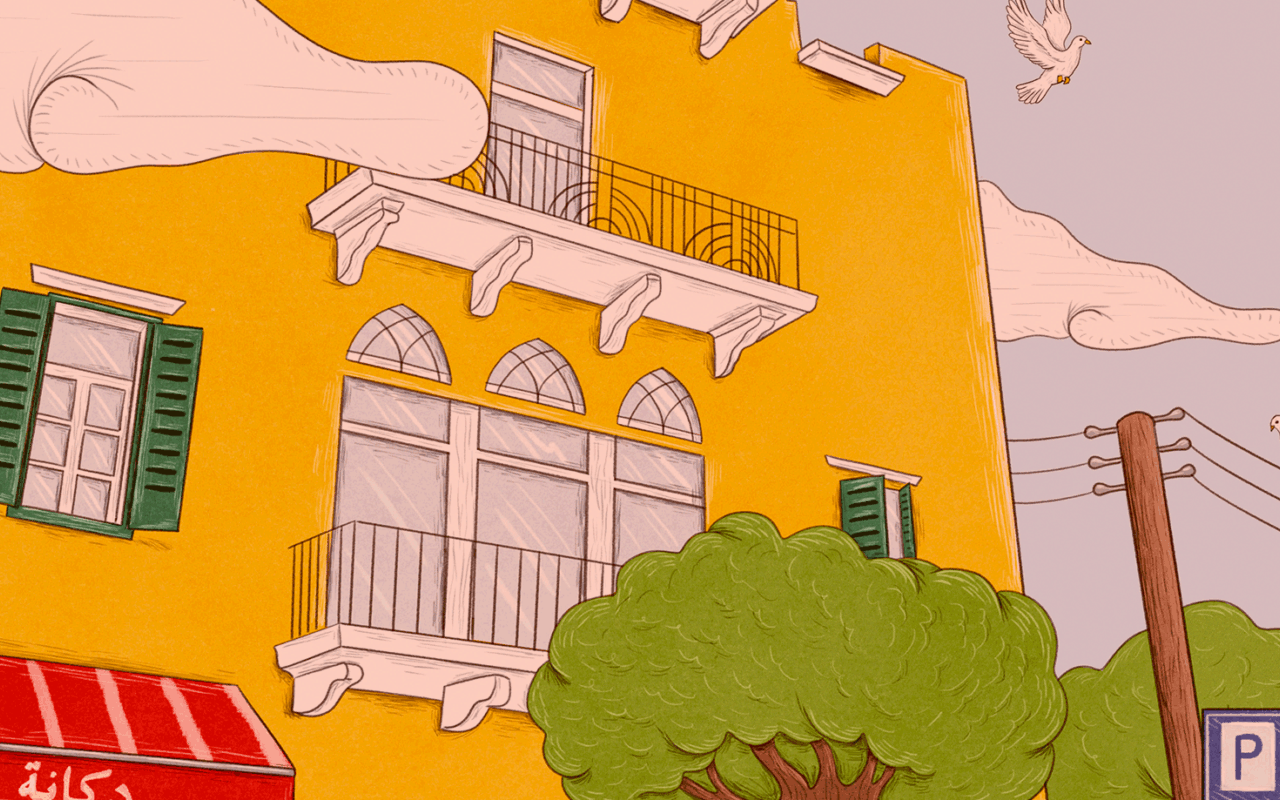After fashion designer George Azzi’s business premises got destroyed by the deadly 2020 blast at Beirut’s port, he considered joining Lebanon’s estimated 15-million strong diaspora like many of his countrymen. In the last few decades, the country has faced several other crises that include a devastating civil war, constitutional collapse, political assassinations and a significant financial meltdown that have driven many to emigrate. Yet, others like George have persisted and thrived despite a stacked deck and political system that resists reform. In this episode, we discover what drives him to stay. We also speak to Mona Harb, co-founder of the Beirut Urban Lab, who reminds us that in places used to tragedy and cycles of crisis, hope endures
EPISODE TRANSCRIPT
George Azzi (GA): I LOVE IT HERE. PEOPLE HERE STRIVE. THEY DREAM, THEY PARTY. THEY LOVE LIFE. JUST A VERY ALIVE CITY, AND A VERY NOISY ONE, BY THE WAY. THE PARTIES HERE ARE MASSIVE. IT’S A VERY VIBRANT CITY.
Dashen Moodley (DM): Despite its history of civil war, sectarian tensions, bombs and economic crises, Beirut really is one of those glamorous cities that people truly LOVE.
[GA:] I MEAN, YOU CAN DREAM OF LIVING IN DIFFERENT CITIES LIKE PARIS AND MILAN, WHERE IT'S THE CAPITAL OF FASHION. BUT I REALLY LIKE IT HERE. FOR SOMEONE THAT, BEFORE COVID-19, USED TO TRAVEL A LOT. I USED TO LOOK FORWARD TO COMING BACK HOME BECAUSE I DON'T KNOW HOW TO EXPLAIN IT, BUT IT'S REALLY DIFFERENT HERE. IT HAS ITS OWN VIBE, LIKE ALL THE LEBANESE AND PEOPLE THAT VISITED BEIRUT UNDERSTAND WHAT I MEAN
Tau Tavengwa (TT): Today, we’re going to try and understand that vibe, and how it holds up in Beirut right now. We want to know what keeps the city going, and what it is learning about itself in this moment of crisis...I’m Tau Tavengwa.
DM: And I’m Dhashen Moodley.
TT: Welcome to the City Show -- a podcast that goes beyond the headlines to figure out what makes cities tick -- often by looking at them through the lens of the people that live there.
GA: I'M GEORGE AZZI, I'M A FASHION DESIGNER FROM LEBANON. I HAVE A FASHION BRAND, A COUTURE HOUSE, ACTUALLY. AND WE STARTED IT TEN YEARS AGO. AND THAT'S PRETTY MUCH IT. I'M AN OPTIMISTIC PERSON, AMBITIOUS AND I’M ALSO A LITTLE SHY.
DM: A little too shy perhaps to say upfront that in 2018, George came to the world’s attention when his couture brand Azzi and Osta was worn by one of the most famous women in the world.
GA: WELL, THAT'S NOT THE FIRST SENTENCE I SAY, BUT I DO SAY IT LATER. YEAH, THAT WAS A MILESTONE FOR THE BRAND AND FOR ME, FOR MY CAREER. SO, UH, YEAH, YOU CAN SAY THAT I'M THE DESIGNER BEYONCE WORE AT THE PRE-GRAMMYS.
DM: After that milestone Beyonce moment, George and his partner Assaad Osta worked on building their brand internationally...but back home, Beirut was struggling. In 2019, people took to the streets to protest proposed taxes in the city. Then Covid-19 hit in 2020, with lockdowns causing more economic problems...
GA: TO BE HONEST, WHEN THE TWENTY TWENTY UNFORTUNATE EVENTS STARTED TO HAPPEN, ONE AFTER THE OTHER, I WAS TELLING MYSELF EVERY TIME, I'M VERY LUCKY THAT SO FAR I'M NOT ALL THAT AFFECTED. I'M THE LEAST AFFECTED, UNTIL THE BLAST.
DM: The blast happened in August 2020 when a large amount of ammonium nitrate stored at the port exploded, causing over two hundred deaths, seven and a half thousand injuries and fifteen billion US dollars in property damage.
GA: IT WAS UNREAL. IT WAS SOMETHING YOU SEE IN MOVIES, YOU DON'T REALLY EXPECT TO SEE IN YOUR OWN LIFE. AND YET THE NEXT DAY, I WAS LAUGHING, INSTEAD OF CRYING BECAUSE, YOU KNOW, LIKE SERIOUSLY LIKE. IS IT A JOKE?
DM: Nine days before the blast, Azzi and Osta had opened their new flagship location after renovating three rented seventeenth century buildings. Hard to come by these days, the complex had its own courtyard with a well, and a huge old olive tree in the middle.
GA: LIKE IT’S A SMALL VILLAGE INSIDE THE CITY ON THE COAST.
DM: ...which also meant -- in a city that’s only seventy square kilometres -- it wasn’t far from the port’s explosion.
GA: I AM EXTREMELY LUCKY TO, NOT JUST BE ALIVE, TO NOT BEING HURT BECAUSE WHERE I SIT USUALLY, MY OFFICE, THE CEILING IS A VERY THICK, VERY HEAVY GLASS ROOF. AND IT ALL WENT DOWN ON EVERYTHING UNDERNEATH. HAVE I BEEN THERE AT THAT MOMENT, I WOULD HAVE BEEN DEAD BY NOW. OF COURSE, I'M SURE.
DM: Ten Azzi and Osta staff members were injured -- three of them critically. Luckily, all recovered. George estimates that if you weigh up the restorations, material loss, machinery and archives, it cost them nearly a quarter million US dollars.
GA: JUST IMAGINE THE SHOCK. CRYING THEN LAUGHING, LAUGHING LIKE YOU KNOW, THIS IS SO PATHETIC. LIKE REALLY IS THIS WHAT WE ARE DOING NOW? WE'RE PACKING AGAIN AND MOVING TO ANOTHER LOCATION. AND IT WAS HEARTBREAKING, REALLY. BUT THIS IS OUR WAY OF COPING WITH THINGS IS TO MAKE FUN OF IT IN LEBANON. IT'S NOT A GOOD THING, BUT AT THE SAME TIME, IT'S THERAPEUTIC. WE MAKE FUN OF OUR OWN MISERY. AND ACTUALLY THAT'S WHAT'S KEEPING PEOPLE ALIVE. SANE, PERHAPS.
Mona Harb (MH): BEIRUT IS MADE OF THESE INCREDIBLE CONTRADICTIONS. INCREDIBLE. AND THAT'S ALSO WHAT MAKES YOU LOVE IT AND HATE IT AND, AND ALWAYS FEEL THAT DUALITY OF BEING EXHILARATED AT LIVING HERE AND AT THE SAME TIME EXHAUSTED AT ITS IMMENSE INTENSITY.
TT: Mona Harb is a professor of urban studies and politics at the American University of Beirut. She’s also co-founder and research-lead at the Beirut Urban Lab, which tracks Lebanon’s urban transformation. Like George, Mona says mocking misery is sometimes necessary, and that's because...
MH: ... BEIRUT IS EXHAUSTING. IT'S A VERY SAD AND EXHAUSTING CITY FOR PEOPLE LIVING HERE. WE'RE EXPERIENCING A SET OF CRISES, INTERLOCKING CRISES, ECONOMIC, FINANCIAL, MONETARY, BANKING, POLITICAL, SOCIAL, AND, OF COURSE, THE HEALTH CRISES, IN ADDITION TO THAT. SO, UM, WAKING UP IN BEIRUT THESE DAYS IS REALLY DIFFICULT BECAUSE THERE'S THIS HEAVINESS OF LIFE AND OF WHAT HAS OCCURRED TO EVERY ONE OF US IN THE CITY. SO IT'S PAINFUL, REALLY, TO SEE THAT TRANSFORMATION. I REALLY FEEL THAT WE ARE LIVING A TRANSFORMATION OF THE CITY EVERY DAY. YOU REALLY FEEL THAT PEOPLE ARE EXPERIENCING THE INJUSTICE AND THE IMPUNITY OF WHAT WE ARE LIVING. AND SO, IN 2019 PEOPLE REALLY TOOK TO THE STREETS IN WAYS THAT WERE UNPRECEDENTED, I WOULD SAY, IN THE POLITICAL HISTORY OF MOBILISATION IN THIS COUNTRY. THERE WAS A BEAUTY, A PROFOUND BEAUTY TO THIS UPRISING.
DM: This uprising took place across the whole country, collectively channeling people’s anger against the injustice and inequality they faced from a callous elite. The protesters chanted for a revolution. They called for accountability from the government, demanding an end to corruption, and the resignation of all political representatives. But although the cabinet resigned, many who had dominated the political scene for decades remained. Mona was in the streets, and, in true Beirut-style, she remembers the protests at times, feeling like a party.
MH: PEOPLE ACCUSED THE REVOLUTIONARIES OF HOLDING RAVE PARTIES. DURING SOME EVENINGS, WE HAD DEEJAY'S PLAYING RAVE MUSIC AND ALSO LIGHT SHOWS. THERE WAS A VERY STRONG VIBE IN THE SPACE, JUST THAT FEELING OF WANTING TO BE IN THE STREETS WITH TOTAL STRANGERS CHANTING TOGETHER AGAINST THE RULING CLASS, AGAINST THE OLIGARCHS. THE CHANTS AGAINST THIS POLITICAL CLASS WERE AMAZING. IT WAS THE FIRST TIME THAT PEOPLE WERE CHANTING, AND NAMING AND SHAMING EACH OF THE POLITICIANS.
TT: There are often stories of excess and decadence by the county’s ruling elite. A good example of this was an exposé by NYTimes in 2019, that Saad Hariri, the then Prime Minister, had gifted 15 million US Dollars to a 20 year old South African bikini model named Candice Van de Merwe. To be fair, he's a billionaire — it was his money— but stories like these angered people and drove them onto the streets.
MH: THAT WENT ON FOR WEEKS. AND IT WAS A VERY INTENSE AND IMPORTANT MOMENT.
DM: A moment that was ended by aggressive police repression. Many protesters were injured, and a few people died. There were a lot of arrests. It created problems for businesses like George’s.
GA: CLIENTS THAT USED TO FLY TO BEIRUT TO DO THEIR SHOPPING FOR COUTURE, FOR EVERYTHING RELATED TO ART AND DECORATION AND WEDDINGS, STOPPED.
TT: This has happened before. There’ve been other periods of trouble in Beirut which have shut down businesses since Azzi and Osta was launched ten years ago. It’s the cost of living in the city...George says when your home is in jeopardy, you quickly learn that you’re on your own. Your government is just not going to help in any way...
GA: IN LEBANON, WHEN YOU HAVE A PROBLEM, YOU JUST HAVE YOURSELF TO FIND THE SOLUTIONS, UNFORTUNATELY. IT'S THE PRIVATE SECTOR ALWAYS, THE PEOPLE THEMSELVES, THE DIASPORA, THE LEBANESE DIASPORA ALSO HELPS. BUT, LISTEN, WHATEVER YOU ARE READING ABOUT BEIRUT, WELL, THEY'RE ALL CORRECT. THE GOVERNMENT HERE IS REALLY CORRUPT, REALLY, REALLY CORRUPT. THE CRISIS IS REALLY BIG. THE GOVERNMENT IS BROKE.
TT: The blast of 2020, in the middle of a global pandemic, brought all of the people’s problems with the government into stark relief. Once again, they had to rely on themselves and each other. Mona says, after everything they’d already been through, many could not even make sense of the depths to which the country had fallen.
MH: THERE IS A SOLIDARITY AMONGST THE LEBANESE PEOPLE IN TIMES OF CRISIS, IN TIMES OF COLLAPSE THAT IS EXTREMELY STRONG. AND YOU KNOW, ALLOWS YOU TO SUSTAIN WHAT WE ARE GOING THROUGH THAT THERE IS A HUMAN CONNECTION THAT HAPPENS, ESPECIALLY IN TIMES OF CRISIS THAT YOU SEE AGAIN AND AGAIN. AND THAT'S SOMETHING STUPEFYING TO EXPERIENCE. AND YOU REALLY WONDER, LIKE, WHERE DOES THIS COME FROM? WHAT HOW CAN PEOPLE DO THIS AGAIN AND AGAIN? THIS TIME IT WAS DONE WITH WITH WITH DISBELIEF, LIKE NO ONE COULD BELIEVE THAT, YOU KNOW, THIS EXPLOSION HAPPENED BECAUSE OF THE CALLOUSNESS AND THE NEGLIGENCE OF THE GOVERNMENT. SO THERE WAS A VERY STRONG ANGER AND HATRED TOWARDS A GOVERNMENT THAT KILLED ITS OWN PEOPLE, THAT ALLOWED EXPLOSIVE TO BE LEFT ON THE PORT UNATTENDED LIKE THAT. AND, CAUSE A THIRD OF THE CITY TO BE DESTROYED LIKE THIS. SO THIS THIS IS A VERY PAINFUL EPISODE OF THE HISTORY OF BEIRUT, I WOULD SAY, AND OF LEBANON AS A WHOLE AND IN THE RELATIONSHIP BETWEEN PEOPLE AND THEIR GOVERNMENT. SO THE GOVERNMENT DID ABSOLUTELY NOTHING. AND NO ONE WANTED THEM TO DO ANYTHING BECAUSE THEY WERE COMPLETELY DELEGITIMIZED, YOU KNOW. SO EVEN IF THEY WANTED TO DO ANYTHING, THERE WAS ZERO TRUST WITH WHATEVER THEY WOULD DO.
DM: According to Mona, maladministration is at the root of the country’s problems. In the end, the responsible authority just neglected to secure the chemicals that caused the blast. It’s a symptom of a much larger issue. Mona says Lebanon’s financial collapse is the result of, what she calls, a Ponzi scheme of the government’s creation…a national investment scam that relies on continuous funds.
TT:….Dhashen, while working on this episode, it was interesting
- Safehaven for christians in the middle east
- Geopolitical strains of sharing borders with both Israel and Syria
- Considered an important democracy in the region
What’s kept the country’s economy going for decades has been a mix of foreign aid from its Western allies, combined with remittances from its diaspora who took advantage of banking secrecy laws and artificial interest rates.
DM: But, Tau, when I spoke to Mona, she says the banks stole that money, and foreign aid has dried up due to accusations of corruption in the government. In short, the Ponzi scheme collapsed.
MH: I MEAN, A PONZI SCHEME PRODUCED BY A GOVERNMENT. CAN YOU BELIEVE THAT? BY A CENTRAL BANK? IT'S NOT A PONZI SCHEME PRODUCED BY, YOU KNOW, A PRIVATE BANKER SOMEWHERE WHO'S GOING TO GET CAUGHT OR WHO IS GOING TO ESCAPE? IT'S A PONZI SCHEME CREATED BY A POLITICAL ECONOMIC SYSTEM. IT CANNOT CONTINUE, LIKE THE WAY IT USED TO BE. IT'S REALLY A STOPPING POINT. AND YOU REALLY FEEL THAT THE KEYWORD NOW IS WAITING. AND H...THERE'S NOT EVEN, THE WORD HOPE DOES NOT COME OUT. IT'S WAITING AND EXPECTING AND SURVIVING THE PERIOD. THAT MIGHT TAKE A LONG TIME. I MEAN, THAT'S GOING TO TAKE YEARS UNTIL THINGS EVOLVE. BUT YOU REALLY FEEL THAT IT’S DYING VERY SLOWLY, IT FEELS LIKE A CORPSE THAT'S TAKING ITS LAST BREATHS. IT'S A VERY SLOW DEATH, ACTUALLY.
GA: I WILL NOT LIE TO YOU. I THOUGHT OF LEAVING. LIKE, ENOUGH IS ENOUGH.
DM: George Azzi admits he considered joining Lebanon’s diaspora, which is estimated to be three times the size of the country’s nearly seven million population. It’s reported that Google searches for the word ‘immigration’ hit a ten year peak after the blast in 2020.
GA: THE LEBANESE POUND LOST NINETY PERCENT OF ITS VALUE, SO ANYBODY THAT HAS A SALARY IN LEBANESE POUND IS DOOMED, LIKE OVERNIGHT BECAME POOR. AND PEOPLE THAT HAD US DOLLARS ACCOUNTS CAN'T WITHDRAW THEIR MONEY IN DOLLARS AND THEY CAN ONLY WITHDRAW THEM IN LEBANESE POUNDS AT A MUCH LESS VALUE THAN THE REAL MARKET, WHAT THEY CALL THE BLACK MARKET HERE. THE ONLY WAY TO NOT BE AFFECTED TO THE CORE IS TO BE A BUSINESS THAT EXPORTS AND HAVE REVENUES, WHAT THEY CALL HERE FRESH U.S. DOLLARS FROM SELLING THROUGH TO OTHER COUNTRIES. OR IF YOU HAVE A DAUGHTER, A BROTHER, A PARENT THAT LIVES AND WORKS ABROAD, THAT CAN SEND YOU U.S. DOLLARS THAT YOU CAN EXCHANGE FOR THE REAL VALUE THAT IT HAS BECOME. SO IT'S IT'S VERY TRICKY. YOU HAVE TO MANOEUVRE IN A MILLION WAY TO SURVIVE. AND IT'S VERY REAL AND IT'S VERY HEARTBREAKING.
TT: In 2018, the year that George dressed Beyonce, textiles and clothing made up two percent of Lebanon’s exports. In a country that imports pretty much everything, this gives those in the fashion industry unique access to sought after foreign currency.
Despite all the recent ups and downs, George has decided not to leave. While Azzi and Osta might soon open an office in Paris, the designers will remain in Beirut -- a city that continues to inspire them.
GA: LIVING IN LEBANON TEACHES YOU TO BE RESOURCEFUL, RESILIENT, AND JUST YOU NEED TO OUTSMART THE SYSTEM EVERY TIME, EVERY TIME, EVERY, LIKE YOU NEED TO FIND SOLUTIONS. IT'S PART OF BEING BROUGHT UP IN THIS CULTURE. AT THE SAME TIME, PEOPLE TALK ABOUT THE LEBANESE RESILIENCE. IT'S A GOOD THING. BUT SOMETIMES IT'S REALLY LIKE, GIVE ME A BREAK, OK, I'M RESILIENT, BUT I DON'T NEED TO BE RESILIENT 24/7.
TT: Like George, I have strong feelings about that word RESILIENCE too. I’m Zimbabwean, and often hear it used in connection to my countrymen. I can't quite figure out whether it's praise or an insult. Mona?
MH: I DO NOT LIKE THIS WORD AT ALL BECAUSE IT DOES NOT RECOGNISE THE FACT THAT LEBANON IS ALSO A COUNTRY OF DEEP, SYSTEMIC STRUCTURAL INEQUALITIES THAT WE HAVE BEEN STRUGGLING WITH SINCE THE CREATION OF LEBANON AND THAT WE ARE ALSO RESPONSIBLE FOR. WE HAVE A POLITICAL SYSTEM THAT PRODUCES THESE INEQUALITIES. SO, WE'RE NOT RESILIENT IN THE SENSE OF LIKE WE'RE TRYING TO SURVIVE SOME GEOPOLITICAL INTERFERENCE THAT COMES FROM OUTSIDE. AND WE'RE HERE LIKE VICTIMS AND PASSIVE AGENTS. I DON'T LIKE THAT DIMENSION OF READING THE LEBANESE CRISIS AND, YOU KNOW, RESPONDING THAT YEAH, LEBANESE WILL BE ABLE TO SURVIVE THIS.
DM: And Mona says the Lebanese people bear some culpability for Beirut’s problems today.
I THINK IT'S IMPORTANT THAT WE TAKE PART OF THE RESPONSIBILITY AS WELL IN RUINING OUR OWN COUNTRY, OF HAVING A POLITICAL SYSTEM THAT WE PRODUCED AND WE REPRODUCED. THAT IS VERY MUCH A KEY TOOL OF THE PRODUCTION OF THESE INEQUALITIES.
DM: George agrees that this constant reproduction of a rotten system is something Lebanon needs to reckon with. For example, despite an assassination, a forced resignation and accusations of graft, the Hariri family continues to dominate Lebanese politics after three decades --
GA: I BLAME IT ON THE POLITICAL CLASS WE HAVE. AND PARTIALLY ON THE PEOPLE ALSO FOR, YOU KNOW, WE ARE A DEMOCRATIC COUNTRY. WE VOTE FOR OUR LAWMAKERS, OUR PARLIAMENTARIANS. SO THERE'S ALSO A BLAME ON THE, ON THE PEOPLE, FOR CHOOSING THE SAME FACES, THE SAME INCOMPETENT PARTIES OVER AND OVER AGAIN. IT’S A COLLECTIVE BLAME.
DM: Mona says what is also COLLECTIVE, is the denial of how Lebanon has reached this point. She blames it on the country’s failure to reckon with its traumatic history.
MH: WE ARE A SOCIETY THAT DID NOT FACE ITS OWN VIOLENCES, ITS OWN RESPONSIBILITIES, WE, TRYING TO EXPLORE TRANSITIONAL JUSTICE AS A MEANS OF EXITING FROM A CIVIL WAR, WE DID NOT EVEN GO THERE. WE CHOSE TO JUST PARDON EVERYONE AND TO TURN THE PAGE AND TO REBUILD A GLITZY CITY WITHOUT ACKNOWLEDGING EVEN THE CAUSES OF THE CIVIL WAR. WE HAVE NO AGREEMENT ON WHAT CAUSED THE CIVIL WAR. WE DON'T RECOGNISE THE FACT THAT WE HAVE DISAPPEARED POPULATIONS. WE STILL HAVE CIVIL SOCIETY GROUPS THAT ASK FOR TRUTH AND JUSTICE ABOUT THEIR DISAPPEARED UP TILL TODAY, 40 YEARS ALMOST AFTER THE END OF THE WAR. SO WE HAVE DEEP-ROOTED ISSUES RELATED TO OUR IDENTITY TO TRUTH, TO JUSTICE THAT HAVE NOT BEEN UNRESOLVED. WE DON'T HAVE AN INDEPENDENT JUDICIARY SYSTEM THAT WE CAN TRUST AND THAT MAKES THINGS ACCOUNTABLE. WE SURVIVE THROUGH DENIAL THAT, YEAH, WE DON'T WORRY TOO MUCH ABOUT TOMORROW, TODAY IS GOOD AND THIS IS WHAT HAPPENED NOW. TODAY IS NO MORE, OK. WE CANNOT NOT THINK ABOUT YESTERDAY AND TODAY, TO BUILD TOMORROW, IF WE WANT TO BUILD A BETTER TOMORROW, WE REALLY NEED TO ACKNOWLEDGE OUR HISTORY, OUR POLITICS, OUR SOCIAL DIVIDES, OUR POLARISATION AND REBUILD FROM THERE.
DM: Having seen how people came together to sweep up their neighbourhood’s broken glass...how families sent money home to help… and how his label Azzi and Osta was back up and running just two weeks after the blast, George feels optimistic.
GA: WE ARE LOOKING FORWARD AND WE ARE VERY POSITIVE ABOUT THE FUTURE. EVEN FOR LEBANON, I AM HOPEFUL BECAUSE, THE GENERATION THAT SAW WITH THEIR EYES, HOW MUCH THINGS CAN GO WRONG AND HOW MUCH THEY HAVE POWER IN THEIR HANDS, I'M PRETTY SURE THIS NEW GENERATION IS VERY PROMISING. I'VE SEEN SO MUCH KINDNESS, SO MUCH ENERGY, AND REALLY I'M LOOKING FORWARD FOR A BETTER FUTURE ONCE THIS PERIOD WILL PASS.
TT: According to Mona, THAT future depends on what people like George decide to do next… what they are willing to put up with -- and how they will fight to change things.
MH: THERE'S A SAYING THAT WE OFTEN REFER TO IN THIS PART OF THE WORLD, WHICH IS NATAMANAA’AN BIL AMILIY. WE’RE CONDEMNED TO HOPE. WHEN YOU'RE BORN IN THIS PART OF THE WORLD, THERE'S NOT MUCH CHOICE, YOU EITHER PACK YOUR STUFF AND LEAVE AND TRY TO MAKE A DIFFERENT LIFE ABROAD OR CONTRIBUTE TO LIFE HERE FROM ABROAD, OR YOU STAY AND RESIST AND SPEAK TRUTH TO POWER. AND THAT'S YOUR LITTLE WINS, YOU KNOW, LIKE YOU ABLE TO TO CRITIQUE OUT LOUD THE INJUSTICE AND THE OPPRESSION YOU'RE SUBJECTED TO, AND SOMETIMES YOU ARE ABLE TO MAKE BIGGER STEPS. IT SOMETIMES FEEL ALL VERY SMALL. BUT, YOU KNOW, IT'S A VERY, VERY LONG JOURNEY. WE HAVE STRUCTURAL INJUSTICES AND INEQUALITIES TO UNPACK THAT ARE DECADES AND EVEN A CENTURY OLD NOW. SO IT'S A VERY LONG JOURNEY OF CHANGE. WE HAVE TO BE VERY PATIENT ABOUT IT. AND IT BECOMES, YOU KNOW, AN INDIVIDUAL CHOICE ALMOST TO TO CHOOSE WHERE DO YOU STRUGGLE, HOW? DO YOU DO IT FROM HERE OR FROM ABROAD? HOW DO YOU DO IT? DO YOU CHANT ABOUT IT OR YOU WRITE ABOUT IT OR YOU ARE IN THE STREETS ABOUT IT? BUT, WE DON'T HAVE MUCH CHOICE BUT TO CONTINUE THAT STRUGGLE AND THAT ORGANISING.
DM: ...And -- the parties in Beirut will also continue. History has shown us that they always do. That’s a wrap of the City Show. I’m DM.
TT: And I’m TT. Thank you for joining us.
______________________________________________________
Thanks to Mona Harb at Beirut Urban Lab, and George Azzi @ Azzi & Osta for sharing their time and stories, and to Rafiki El Hariri for the artwork









